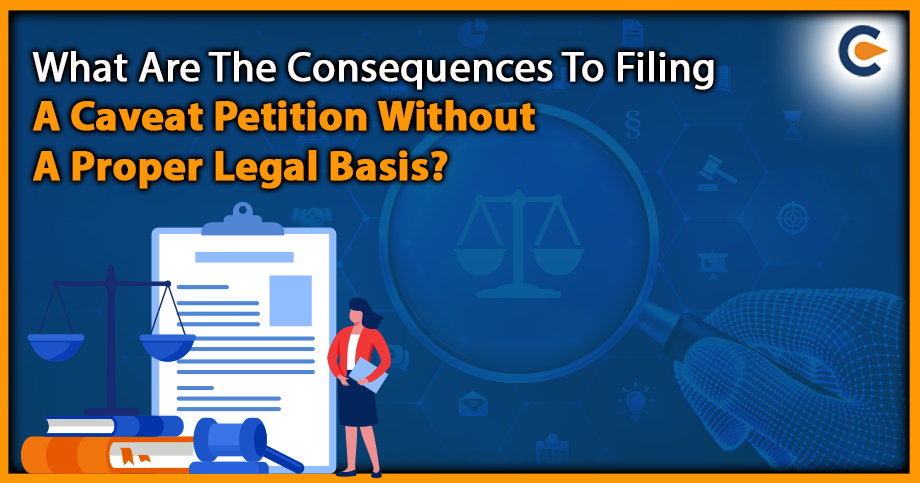A caveat petition is a legal tool[1] used to protect the interests of a party in a legal proceeding. It is filed with the court to ensure that no order or decree is passed without giving the petitioner an opportunity to be heard. However, filing a caveat petition without proper legal grounds can have serious consequences. In this blog, we will discuss in detail the consequences of filing a caveat petition without a proper legal basis.
Rejection of the Petition:
One of the most immediate consequences of filing a caveat petition without proper legal grounds is the rejection of the petition by the court. The court will not entertain a petition that is not based on proper legal grounds. If the petition is rejected, the caveator may lose their opportunity to be heard in the matter. This can be detrimental to their interests in the legal proceeding.
Imposition of Costs:
If a caveat petition is filed without proper legal grounds, the other party may be entitled to recover costs incurred as a result of the petition. The court may impose costs on the caveator for filing the petition without proper legal grounds. This could include legal fees and other expenses. The imposition of costs can be a significant financial burden on the caveator.
Loss of Credibility:
Filing a caveat petition without proper legal grounds can lead to the caveator losing credibility with the court. This can have long-term consequences for the caveator, particularly if they have to appear before the same court in the future. The court may view the caveator as someone who files frivolous petitions without proper legal grounds. This can harm their reputation and make it difficult for them to be taken seriously in future legal proceedings.
Delay in Proceedings:
Filing a caveat petition without proper legal grounds can lead to unnecessary delay in the legal proceedings. This can be frustrating for all parties involved in the matter. The court may need to spend additional time evaluating the petition and determining whether it has proper legal grounds. This can cause delays in the legal proceedings and may even result in adjournments.
Dismissal of the Case:
If the court finds that the caveat petition was filed without proper legal grounds, it may dismiss the case altogether. This can be a devastating outcome for the caveator, as it means that their interests in the legal proceeding will not be protected. The dismissal of the case can have serious consequences for the caveator, particularly if they have a lot at stake in the legal proceeding.
Adverse Order or Judgment:
If a caveat petition is filed without proper legal grounds and the court is convinced that it was filed solely for the purpose of delaying the legal proceedings or harassing the other party, it may pass an adverse order or judgment against the caveator. This could include penalties or even criminal charges in extreme cases.
Damage to Relationships:
Filing a caveat petition without proper legal grounds can also damage the relationships between the parties involved in the legal proceeding. It can create a sense of distrust and hostility between the parties, making it difficult for them to work together to resolve the legal matter amicably.
Waste of Resources:
Filing a caveat petition without proper legal grounds can also result in the waste of resources. The court may need to spend additional time and resources evaluating the petition, which could have been better used in resolving the legal matter. This can be a drain on the resources of the court and the parties involved in the legal proceeding.
Negative Impact on Future Legal Matters:
Filing a caveat petition without proper legal grounds can have a negative impact on future legal matters. If the court dismisses the petition or passes an adverse order or judgment against the caveator, it could harm their chances of success in future legal proceedings. This is because the court may view them as someone who files frivolous petitions without proper legal grounds.
Reputation Damage:
Finally, filing a caveat petition without proper legal grounds can damage the caveator’s reputation. This is because the other party and their lawyers may view them as someone who is willing to abuse the legal system to gain an advantage in the legal proceeding. This can harm their professional and personal reputations and may make it difficult for them to conduct business or personal affairs in the future.
Conclusion
Filing a caveat petition can be a useful legal tool to protect one’s interests in a legal proceeding by ensuring that no order or decree is passed without giving the petitioner an opportunity to be heard. However, filing a caveat petition without proper legal grounds can have serious consequences that can harm the petitioner’s interests in the proceeding. The consequences of filing a caveat petition without proper legal grounds include the rejection of the petition by the court, imposition of costs on the petitioner, loss of credibility with the court, delay in the proceedings, dismissal of the case, adverse orders or judgments, damage to relationships, waste of resources, negative impact on future legal matters, and reputation damage. Therefore, it is crucial to have a proper legal basis before filing a caveat petition to avoid these consequences and protect one’s interests in the legal proceeding.
Read Our Article: Consequence Of Filing A Caveat Petition -Understanding The Potential Risks











